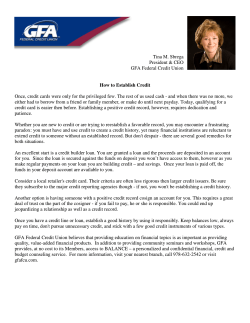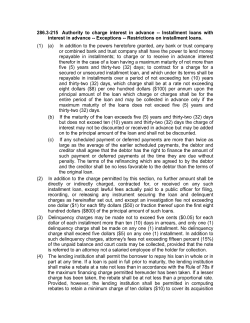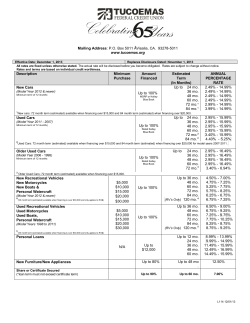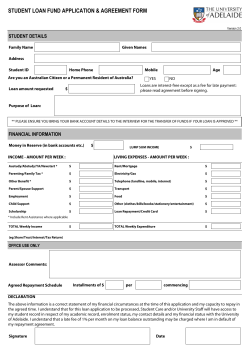
YOUR HOME: HOW TO BUY IT, KEEP IT, AND PROTECT IT ©
YOUR HOME: HOW TO BUY IT, KEEP IT, AND PROTECT IT FAIR HOUSING/FAIR LENDING© West Tennessee Legal Services, Inc. in conjunction with Center for Economic Education University of Memphis 2009 The work that provided the basis for this publication was supported by funding under a grant with the U.S. Department of Housing and Urban Development. The substance and findings of the work are dedicated to the public. The author and publisher are solely responsible for the accuracy of the statements and interpretations contained in this publication. Such interpretations do not necessarily reflect the views of the Federal Government. 2 BE CAREFUL ON THE FRONT END TO ENSURE A SUCCESSFUL, HAPPY HOMEOWNERSHIP EXPERIENCE Benefits of Homeownership • Owners have greater self-esteem (Rossi and Weber - 1996) • Owners are more involved in community organizations, voting and other activities (DiPasquale and Glaser – 1997) • Children of owners are more likely to buy homes (Boehm and Schlottmann 1999) Advantages vs. Disadvantages of Home Ownership • ADVANTAGES: • A place of your own • Financial incentives – Increased Value/Equity • Scheduled savings – Stable housing costs – Tax benefits • DISADVANTAGES: • High cost of homeownership • Possibility of foreclosure • Decreased mobility • Repairs and maintenance Knowing and Understanding Your Credit • What is Credit? – • Trust or confidence in a buyer’s ability and intention to fulfill financial obligations. How can a budget help improve my credit? – Four steps to making a budget. 1. 2. 3. 4. List your income List your expenses Compare income and expenses Set priorities and make changes so that your income will be greater than your expenses. How to Increase Borrowing Power • Pull your credit report at least 6 months before you are ready to purchase. • Reduce your existing long-term debt. • Wait to apply for a mortgage until your income increases, or • Find a financing option that results in a lower down payment and lower monthly mortgage payments. Individual Credit Reporting Agencies • Equifax – Web: www.equifax.com • Phone: (800) 685-1111 • Experian – Web: www.experian.com • (866) 200-6020 • TransUnion – Web: www.transunion.com • (800) 888-4213 What is a FICO* Score? • FICO scores are your credit rating • They range from 300-850, higher is better • Most lenders base approval on them • Higher scores mean lower interest rates • The median FICO score in the U.S. is 723. • FICO scores are calculated based on your rating in five general categories: *Fair Isaac Corporation developed the FICO Score. How are FICO Scores Figured? How is my FICO Score figured? Types of Credit Used 10% New Credit 10% Payment History 35% Length of Credit History 15% Amounts Owed 30% What’s Considered Bad Credit? • FICO scores above 700 are very good. Scores below 620 indicate high risk. • Public record* and collection items are considered quite serious, although older items like these will count less than recent ones. • Late or missed payments. A 60 day late payment is not as bad as a 90 day late payment. Recent and frequent late payments will hurt your score. • Having no late payments doesn’t mean a perfect score. * Bankruptcies, repossessions, judgments, charge-offs, etc. How to Boost Your Score • Keep balances low. High outstanding debt on credit cards or “revolving accounts” can negatively affect your credit score. Nearly “Maxing out” on credit lines can negatively impact your score. • Pay off debt rather than moving it around can positively affect your credit score. Paying down installment loans is a good sign that you are able and willing to manage and repay debt. How to Boost Your Score • Don’t close unused accounts. Owing the same amount but having fewer open accounts may lower your FICO score. Also, having a very small balance without missing a payment shows that you have managed credit responsibly, and may be slightly better than carrying no balance at all. • Don’t open a number of new credit cards that you don’t need. This approach could backfire and actually lower your FICO score. • How many accounts have balances? A large number can indicate higher risk of over-extension. How to Boost Your Score • What else will help me take control of my credit? •Pay loans first •Pay off credit cards every month •Remind yourself that credit cards are loans •If you feel you can wisely use a credit card, choose one with low interest rate and no (or very low annual fees) •Try to pay more than the minimum due each month •Use your credit card to establish good credit •Look for ways to cut your expenses or increase your income •Keep track of bills and past-due notices How to Boost Your Score • If you have missed payments, get current and stay current. The longer you pay your bills on time, the better your score. • Paying off a collection account or closing an account on which you previously missed a payment, will not remove it from your credit report. • If you are having problems paying your debts, call your creditors or a credit counselor to discuss your options • Stay away from “credit-repair” companies. • In general, a longer credit history will increase your FICO score. Creating a Credit History • How can I create a credit history if I don’t have one? – Keep copies of bills you pay, including your rent, telephone, electricity, cable television, gas, and insurance. – Keep copies of the canceled checks used to pay your bills. – Ask your landlord, the telephone company, and the utility company to write you a letter. – Obtain a “secured” credit card or CD loan. – If you are married, make sure some credit accounts are in your own name – If you have been managing credit for a short time, don’t open a lot of new accounts too rapidly. Shopping for a Home • There’s a home with your name on it. – The trick is simply to find it. • A realtor can help. • Decide in advance exactly what you want. – What neighborhood? – Near schools, shopping, your job – what is important? • Look on weekends AND at night – check for crime, check with the police department. Making an Offer • Before you decide how much to offer-get a professional home inspection. • How long has the property been on the market? • An offer can be accepted or rejected. – Seller may counter your offer by asking a higher price or by making changes in the sales contract. Terms of the Contract – – – – Financing Contingency Inspection Contingencies Professional home inspections Environmental hazards to investigate •Lead based paint, Asbestos, Formaldehyde, Hazardous wastes sites – Appraisal Contingency – Other Provisions •Repair work, Personal Property, Closing and occupancy date, Clear Title – Negotiating the final purchase price Selecting Loans • Choosing a Mortgage that’s right for you. – – – – Conventional VA FHA Rural Housing (FmHA) • Look for state housing finance loan assistance for first-time borrowers If Your Loan Application is Rejected • Understand why the loan was denied – – – – – Insufficient funds Insufficient income Too much debt Poor credit rating Low appraisal Closing • Preparing for closing – Setting the closing date – Selecting an attorney – Meeting conditions of the loan offer – Title Search – Title Insurance – Survey – Termite certificate – Homeowner’s insurance – Type of ownership – Homeowner’s warranty – Final walk-through inspection – Final estimate of closing costs The Closing Documents • HUD-1 Settlement Statement • Truth-in-lending (TIL) statement • The Note • The mortgage (Deed of Trust) • Affidavits • The Deed • Allocation of closing costs • Fees paid to the lender • Advance payments or prepays What if You Get Behind? • Don’t assume all is lost. – Lenders are increasingly willing to help: some options depend upon the type of loan. – Loss mitigation •Forbearance agreement •Moratorium •Re-amortization •Interest Credit – Deed-in-lieu of foreclosure – Short sale • Be as forthright as you can about your situation. – The sooner you get help, the better! What if You Get Behind? • Don’t assume all is lost. – Special government programs available through lenders: •HAMP – Home Affordable Modification Program •HARP – Home Affordable Refinance Program •State housing finance program • Borrowers have a private right of action to enforce the loss mitigation rules in Reg. X at 12 C.F.R.§1024.41 under the Real Estate Settlement Procedures Act, 12 U.S.C.§2605(f). – May also contact the Consumer Financial Protection Bureau: consumerfinance.gov What if You Get Behind? • Don’t assume all is lost.(continued) • Contact a HUD approved housing counseling agency • Talk with a certified housing counselor • Go to HUD.gov for names of agencies near you. A STUDY IN PREDATORY LENDING 27 Sub-Prime Lending • Lending that provides credit to borrowers with past credit problems at a higher cost than conventional mortgage loans. • Good sub-prime lending is needed for those with impaired credit and can be profitable without engaging in any predatory practices. • Sub-prime loans are often given to borrowers with good credit. This is an unethical and predatory practice. 28 Predatory Lending • Targets vulnerable consumers • Includes excessive fees and charges • Uses overly aggressive and/or deceitful practices • No regard for ability to meet obligation • Potentially strips the equity from borrowers and leads to foreclosure 29 Potential Predatory Victims • Homeowners with high equity and credit problems who need cash • Elderly households • Low-income households • Minority households • Households in financial crisis caused by health problems, job loss, death of spouse or major home repairs • Homeowners who lack financial management skills • Homeowners with sub-par credit histories 30 Predatory Credit Practices • Aggressive marketing and solicitations to targeted neighborhoods • Home improvement scams • Kickbacks to mortgage brokers (Yield Spread Premiums) • Racial steering to high rate lenders • Purposely structuring loan payments the borrower cannot afford 31 Predatory Credit Practices • Falsification of loan applications (particularly income level) • Adding insincere co-signers • Purposely targeting and making loans to mentally incapacitated homeowners, knowing the individual does not understand terms of the loan, because of their disability/ies • Forging signatures on loan documents (i.e., required disclosures) • Shifting unsecured debt into mortgages 32 Predatory Credit Practices • Loans in excess of 100% LTV (Loan to Value) • Changing loan terms at closing (especially fixed to ARM/adjustable rate mortgage) • Charging excessive interest, points, and fees • Repeatedly refinancing a loan without providing any real value to the borrower 33 Predatory Credit Practices: Indicators in the Loan Documents • High annual interest rates • High points or padded closing costs • Balloon payments • Negative amortization • Inflated appraisal costs • Padded recording fees • Bogus broker fees/no logical explanation and/or duplication of service • Unbundling (itemizing duplicate services and charging separately for them) • Required credit insurance • Falsely identifying loans as lines of credit • Force placed homeowners insurance • Mandatory arbitration clauses 34 Predatory Credit Practices: Indicators after Closing • Flipping (repeatedly refinancing, often after highpressure sales) • Daily interest when loan payments are late • Abusive collection practices • Excessive prepayment penalties • Foreclosure abuses • Failure to report good payment on borrower’s credit reports • Failure to provide accurate loan balance of payoff amount 35 Federal Laws and Regulations Protecting Consumers • The Truth in Lending Act (“TILA”) – 15 U.S.C.§1601, et seq. • The Home Ownership and Equity Protection Act (“HOEPA”) • Regulation Z (12 C.F.R.§1026.1, et seq.) • The Real Estate Settlement Procedures Act (“RESPA”) – 12 U.S.C.§2601, et seq. • Regulation X (12 C.F.R.§1024.1, et seq.) 36 Federal Laws and Regulations Protecting Consumers • Credit Repair Organizations Act – 15 U.S.C.§1679, et seq. • Fair Debt Collection Practices Act – 15 U.S.C.§1692, et seq. 37 Federal Laws and Regulations Protecting Consumers • Dodd-Frank Wall Street reform and Consumer Protection Act of 2012 (Dodd-Frank Act) – Changes in: – Reg. Z (which implements the Truth in Lending Act):Effective 1/10/14 – Reg. X (which implements the Real Estate Settlement Procedures Act): Effective 1/10/14 – Amends Equal Credit Opportunity Act (ECOA): Effective 1/18/2014 – Rules on providing Appraisals and other Valuations (12 C.F.R.§§1002.4 and 1002.14) 38 Federal Laws and Regulations Protecting Consumers • The Truth in Lending Act (“TILA”) • Is a disclosure statute providing consumers with accurate information concerning the cost of credit • Disclosure “Federal Box” must be given before consummation • Focus here is on “close-end credit” – 15U.S.C.§1602: Definitions and rules of construction • (v) Material disclosures include disclosure of the APR (Annual Percentage Rate which is the cost of credit in yearly rate), method of determining the finance charge and balance upon which finance charge will be imposed, amount of the finance charge, amount financed, total of payments, number of and amount of payments, due date dates/periods of payments scheduled to repay, disclosures under §1639(a) 39 Federal Laws and Regulations Protecting Consumers • The Truth in Lending Act – 15U.S.C.§1635: Right of rescission as to certain transactions where a security interest is or will be retained or acquired on a person’s principal dwelling when certain disclosures have not been made: • 3 business days after consummation or all disclosures provided, with outside date of 3 years – 15U.S.C.§1638: Transactions other than under an open end credit plan • Must be made twice: – Preliminary disclosures not later than 3 business days after written application, at least 7 business days before consummation. – Final disclosures provided at consummation. – 15U.S.C.§1639: Requirements for certain mortgages (“HOEPA”) (high cost mortgages) • Additional disclosures as required under Reg. Z §1026.32. 40 • Civil Liability: Damages:15 U.S.C. §1640 • Actual damages • Statutory damages of not less than $400 or more than $4,000 • With enforcement of rescission, costs of the action and reasonable attorney fees • With failure to comply with requirements under HOEPA (15 U.S.C.§1639 (high cost loans), amount equal to the sum of all finance charges and fees paid by the consumer (if failure to comply is material) 41 Federal Laws and Regulations Protecting Consumers • Regulation Z - Changes Dodd-Frank Act: 1/10/14 – 12 C.F.R.§1026.17 - General disclosure requirements – 12 C.F.R.§1026.20 - Disclosure requirements regarding post-consummation events – 12 C.F.R.§1026.36 - Prohibited acts or practices in connection with credit secured by a dwelling – 12 C.F.R.§1026.41 (addition) Periodic statements for residential mortgage loans 42 Reg. Z: 12 C.F.R.§1026.2: Some Definitions • 12 C.F.R.§1026.2(a)(10): “Closed-end credit means consumer credit other than ‘open-end credit’ . . .” • 12 C.F.R.§1026.2(a)(11): Consumer means a “. . . natural person to whom consumer credit is offered or extended.” For rescission, the term includes “. . . a natural person in whose principal dwelling a security interest is or will be retained or acquired, if the person’s ownership interest is or will be subject to the security interest.” • 12C.F.R.§1026.2(a)(12): Consumer credit means “credit offered or extended to a consumer primarily for personal, family or household purposes.” • 12 C.F.R.§1026.2(a)(17)(v): “A person regularly extends consumer credit only if it extended credit . . . more than 5 times for transactions secured by a dwelling . . . in the preceding calendar year “. . .or “in the current calendar 43 year.” For HOEPA loans, 2 or more times per year. Reg. Z: 12 C.F.R.§1026.4: Some Definitions • 12 C.F.R.§1026.4(a) : “Finance charge is the cost of consumer credit as a dollar amount. It includes any charge payable directly or indirectly by the consumer and imposed directly or indirectly by the creditor as an incident to or a condition of the extension of credit. It does not include any charge of a type payable in a comparable cash transaction.” • 12C.F.R.§1026.4(b)(1) – (5): Examples of finance charges: interest, time price differential, and any amount payable under an add-on or discount system of additional charges; service, transaction, activity, and carrying charges, including any charges imposed on a checking or other transaction account to the extent that the charge exceeds the charge for a similar account without a credit feature; points, loan fees, assumption fees, finder’s fees, and similar charges; appraisal, investigation, and credit report fees; premiums or other charges for any guarantee or insurance protecting the 44 creditor against the consumer’s default or other credit loss; Reg. Z: 12 C.F.R.§1026.4: Some Definitions • 12C.F.R.§1026.4(b)(6) – (10): Charges imposed on a creditor by another person for purchasing or accepting a consumer’s obligation, if the consumer is required to pay the charges in cash, as an addition to the obligation, or as a deduction from the proceeds of the obligation; premiums or other charges for credit life, accident, health, or loss-of-income insurance, written in connection with a credit transaction; premiums or other charges for insurance against loss or damage to property, or against liability arising out of the ownership or use of property, written in connection with the credit transaction; discounts for the purpose of inducing payment by a means other than the use of credit; charges or premiums paid for debt cancellation or debt suspension coverage written in connection with a credit transaction, whether or not the coverage is insurance under applicable law. 45 The Truth in Lending Act (“TILA”) 15 U.S.C.§1638, Reg. Z § 1026.18 • The information: Closed-end Credit: – Identity of creditor making disclosures – Amount financed: amount the borrower gets for their own benefit – Itemization of amount financed – Finance change: ex: interest, service charges, points or origination fees, and other costs associated with credit – APR: Annual Percentage Rate: cost of the credit in46 a yearly rate The Truth in Lending Act (“TILA”) 15 U.S.C.§1638, Reg. Z § 1026.18 • The information: Closed-end Credit (cont.): – – – – – – Payment Schedule Total of Payments Security Interests Prepayment/late payment penalties Assumption policy Interest rate and payment summary 47 The Truth in Lending Act (“TILA”) 15 U.S.C.§1638, Reg. Z § 1026.18 • The information: Closed-end Credit (cont.): – “No-guarantee-to-refinance” statement – Special Formatting Rules: •Clear and conspicuous/reflect legal obligations of parties •Segregated from other information •In a form the consumer can keep before consumption 48 Federal Laws and Regulations Protecting Consumers • The Real Estate Settlement Procedures Act (“RESPA”) 12 U.S.C.§2601, et seq. and 12C.F.R.§1024.7 – 3 business days after application “GFE” Good Faith Estimate: • Usually on a HUD-1 • Itemizes every charge associated with the transaction (ex: points and fees, closing costs, broker’s fees) – WARNING: Under Dodd-Frank, there will in the future be 1 document provided at closing which combines the functions of the present Settlement Statement (HUD-1) and TILA Disclosure Statement. There is no present target date for implementing that provision. 49 • The Real Estate Settlement Procedures Act (“RESPA”) 12 U.S.C.§2601, et seq. – Booklet explaining costs – At closing, receive HUD-1 – No remedies for the above violations, but violation may be a violation of state unfair and deceptive practices act 50 • The Real Estate Settlement Procedures Act (“RESPA”) 12 U.S.C.§2601, et seq. – Provides for servicer obligations (cont.) •Must tell borrower about possibility of loan transfer •Must tell borrower when transfer is imminent •Can use to question account •Places duty on servicer to pay property taxes, insurance, other escrowed monies (can provide remedies for violation), except for no escrow loans. 51 • The Real Estate Settlement Procedures Act (“RESPA”) 12 U.S.C.§2601, et seq. – Prohibition of fees for preparation of truth-inlending, uniform settlement, and escrow account statements 52 Federal Laws and Regulations Protecting Consumers • Regulation X (12 C.F.R.§1024.1, et seq.) – §1024.2 – Definitions – §1024.7 – Good faith estimate – §1024.17 – Escrow accounts – §1024.21 – Mortgage servicing transfers 53 • The Real Estate Settlement Procedures Act (“RESPA”) 12 U.S.C.§2601, et seq. – Effective 1/10/2014 borrower inquiries are no longer handled by a “Qualified Written Request” (QWR) – Are handled by: •Request for Information •Error Resolution/Notice of Error – Are remedies for violations and escrow servicing violations. 54 Federal Laws and Regulations Protecting Consumers • Credit Repair Organizations Act,15 U.S.C. §1679, et seq. – To ensure that prospective buyers of the services of credit repair organizations are provided with information necessary to make an informed decision regarding purchase – To protect the public from unfair or deceptive advertising and business practices 55 Federal Laws and Regulations Protecting Consumers • Credit Repair Organizations Act,15 U.S.C. §1679, et seq. – Covers any transaction where credit is offered or extended for personal, family, or household purposes – Credit repair organization means any person who uses interstate commerce or mails to sell, provide or perform (or present same) any service, in return for payment of money or other valuable consideration for the express or implied purpose of 56 Federal Laws and Regulations Protecting Consumers • Credit Repair Organizations Act,15 U.S.C. §1679, et seq. – Credit repair organization (definition cont.) •Improving consumer’s credit record, credit history, or credit rating •Providing advice or assistance to consumer with regard to any activity or service above •Doesn’t include – Nonprofit exempt under 501(c)(3) – Creditor to whom debt is owned working with consumer – Any depository institution or credit union debt 57 Tennessee Laws Protecting Consumers • Tennessee Credit Services Businesses Act – T.C.A.§47-18-1001, et seq. • Tennessee Consumer Protection Act – T.C.A.§47-18-104(b) – See recent limitations: – James M. Davis, Less Protection: Revisions Narrow Scope of Tennessee Consumer Protection Act, 49 TENNESSEE BAR JOURNAL NO.2, 12,14 (2013). 58 Tennessee Laws Protecting Consumers • Tennessee Consumer Protection Act/ForeclosureRelated Rescue Services – T.C.A. 47-18-5401-02 • Tennessee Home Loan Protection Act – T.C.A. §45-20-101, et seq. • Tennessee Home Solicitation Sales Act of 1974 – T.C.A.§47-18-701, et seq. – T.C.A. 47-18-5401-02 59 Predatory Lending: A Fair Lending Issue • Targeting minority or elderly households for marketing of higher priced and unequal loan products. • Treating individuals of protected classes differently than comparably credit-worthy whites in the loan process. • Policies and practices that have a disparate impact on protected classes. 60 THE FAIR HOUSING ACT: FAIR HOUSING/ FAIR LENDING 61 Historic Perspective • Nineteenth century – – – – – Thirteenth Amendment (1865) The Civil Rights Act of 1866 Fourteenth Amendment (rat. 1868) The Civil Rights Act of 1871 Plessy v. Ferguson (1896) • Twentieth century – – – – – Brown v. Board of Education of Topeka (1954) (Race) Executive Order 11062 (1962) (Race) The Civil Rights Act of 1964 (Race, Color, National Origin) Shelley v. Kramer (1948)(Race) Jones v. Alfred H. Mayer Co. (1968)(Race) 62 Fair Housing Act of 1968 "It is the policy of the United States to provide, within Constitutional limitations, for fair housing throughout the United States." - 42 U.S.C. §3601 63 Markets Covered • Rental • Sales • Lending • Insurance • (All Areas Connected With Residential Housing) 64 Fair Housing Act of 1968, and as Amended The Protected Classes: 1. Race – identification based upon traits 2. Color – the color of the individual’s skin 3. Religion – religious beliefs or practices of the individual 4. National Origin – country where individual or ancestors were born 5. Sex – gender (Act amended, 1974) 6. Familial Status: Families with Children 7. Handicapped Status: Persons with Disabilities 65 Examples of Illegal Conduct: • “We don’t make loans to African-Americans.” • “We don’t make loans in that neighborhood.” (and the neighborhood is predominantly black) • “Your insurance rates will be higher because you want to live in a black neighborhood.” • “We don’t sell to Hispanics.” • “People like you have to live in the back of the condominium complex.” 66 Familial Status: What is the Meaning? • 1 or more persons under 18 living with --(a) a parent or other person with custody; or (b) a person chosen by the parent or person with custody, with written permission • Includes a person --(a) who is pregnant (b) in process of securing legal custody (c) with written consent for minors to reside with that person 67 Examples of Illegal Conduct: • People with children can only live in certain areas. • “No children allowed.” • “Only families with young children allowed.” • “Only families with 1 child allowed.” 68 “Handicap Status”: What is the Meaning? • A physical or mental impairment which substantially limits 1 or more major life activities; • A record of an impairment; or • Being regarded as having such an impairment (whether a person has an impairment or not) Exceptions: (a) current, illegal use or addiction to a controlled substance as defined in section 102 of The Controlled Substances Act (b) conduct toward a person solely because a person is a transvestite 69 Examples of Illegal Conduct: • “We don’t sell condos to people in wheelchairs.” • “We don’t make loans to people with mental disabilities.” • “You need a handicap condo and we don’t have one.” • “I think you have HIV infection and AIDS; we don’t sell to people like you.” 70 Examples of Persons Considered to be Persons with Disabilities 1. People suffering from Alzheimer’s Syndrome 2. People suffering from senile dementia and organic brain syndrome 3. People limited by mental retardation 4. Elderly people suffering from chronic illnesses 5. People with schizophrenia 6. People diagnosed with HIV infection or other infectious diseases 7. People who are mobility impaired 71 What is a Major Life Activity? Major life activities include but are not limited to: 1. Caring for one’s self 2. Performing manual tasks 3. Walking 4. Seeing 5. Hearing 6. Speaking 7. Breathing 8. Learning 9. Working 72 Covered Dwellings • Examples • Private and Subsidized Property/ies • Single Family Dwellings • Duplexes • Multi-Family Buildings • Migrant Housing • Temporary Shelters • Group Homes • Assisted Living Housing • Other Residential Housing: “Where I Live” 73 Conduct Prohibited by 42 U.S.C.§3604(a) •Refusal to sell/rent after making a bona fide offer, refusal to negotiate, or otherwise make unavailable or deny . . .because of race, color, religion, national origin, sex or familial status 74 Conduct Prohibited by 42 U.S.C.§3604(a) • Examples: 1. Delaying tactics in sale or rental 2. Creating different harder procedures in the application process 3. “Grudgingly” making housing available or making people feel unwelcome 4. “We don’t want to lower the price or take a second mortgage.” (when the seller would for people of a different race) 5. “We decided not to sell.” (when the house is available for persons of a different race) 75 Conduct Prohibited by 42 U.S.C.§3604(b) •Difference in terms, conditions, privileges of sale or rental of a dwelling or provision of services or facilities . . . because of race, color, religion, national origin, sex, familial status 76 Conduct Prohibited by 42 U.S.C.§3604(b) • Examples: 1. Demanding higher down payments or prices from members of a protected class 2. Applying different terms that are higher to meet for members of a protected class 3. Denying facilities or services to members of a protected class 4. Providing more favorable conditions or terms such as a “special” to members of 1 class but not to their counterpart 5. “You can only have 1 child living with you in a 2 bedroom apartment.” 77 Conduct Prohibited by 42 U.S.C.§3604(c) •To make, print, publish, or cause to be made, printed, or published a notice, statement or advertisement . . . that indicates a preference, limitation, or discrimination based on race, color, religion, national origin, sex, familial status, or handicap status 78 Conduct Prohibited by 42 U.S.C.§3604(c) • Examples: 1. Newspaper ads that say “whites only” or “white home” 2. Steering people to an area with statements that encourage 1 area over another based on protected class (usually race, ethnicity or religion) 3. Placing or enforcing restrictive covenant in deeds (usually based upon race or religion) 4. “We will not sell our house to a Hispanic family.” 5. “I think your friends have AIDS, so I will not sell to you.” 79 Conduct Prohibited by 42 U.S.C.§3604(d) •Representing that a dwelling is not available for inspection, sale, or rental when it is available, because of race, color, religion, national origin, sex, familial status, or handicap status 80 Conduct Prohibited by 42 U.S.C.§3604(d) •Examples: 1. A Hispanic couple is told that a particular unit is sold. (and discovers several weeks later that the dwelling remains available and was for sale when they inquired) 2. When the wife, who is white, visited the condo complex, she was told that there were several units for sale. When her husband, who is African-American, later in the day visited the complex with her, they were told that all units were sold, with the agent saying “You must have misunderstood me.” 81 Conduct Prohibited by 42 U.S.C.§3604(e) •For profit, inducing or attempting to induce a person to sell or rent a dwelling by representations about entry or possible entry into the neighborhood of members of a protected class 82 Conduct Prohibited by 42 U.S.C.§3604(e) • Examples: 1. In order to make money, an agent asks homeowners to let the agent sell their house because AfricanAmericans are moving into the neighborhood and the agent tells the homeowners that property values will decrease because of it. 2. Placing leaflets around the neighborhood about who (a protected class member) is moving into the neighborhood in order to scare people into selling their dwellings and offering to help them sell their house. (usually the agent will also steer the seller into another neighborhood that is of the seller’s race) 83 Conduct Prohibited by 42 U.S.C.§3604(f)(1) • It is unlawful - (1) To discriminate in the sale or rental, or otherwise make unavailable or deny, a dwelling to a buyer or renter because of a handicap of - (A) that buyer or renter, (B) a person in or intending to reside in that dwelling after it is sold, rented or made available; or (C) any person associated with that buyer or renter. 84 Conduct Prohibited by 42 U.S.C.§3604(f)(1) • Examples: 1. A refusal to sell a house to a person because the individual has AIDS. 2. A refusal to negotiate the price of a dwelling because the individual is mobility impaired. 3. “I will not sell a dwelling to you because I think that your friends have AIDS.” 4. The sales office is not accessible for persons who are mobility impaired. 85 Conduct Prohibited by 42 U.S.C.§3604(f)(2) •Difference in terms, conditions, privileges of sale or rental or provision of services or facilities in connection with the dwelling based upon handicap of the individual homeseeker; one residing with the homeseeker; or any person associated with the homeseeker. 86 Conduct Prohibited by 42 U.S.C.§3604(f)(2) • Examples: 1. Refusing to accept a co-mortgagor on a note because the purchaser has HIV/AIDS, when accepting a co-mortgagor in other instances not involving persons with disabilities 2. Denying access to the swimming pool to a person who is mobility impaired because of that impairment 87 Coverage Specific to Persons with Disabilities: •Reasonable Modification of Residential Dwellings •Reasonable Accommodation to Rules, Policies, Practices, Procedures •Accessibility Guidelines for Covered Multi-Family Dwellings Built for First Occupancy After March 13, 1991 88 Conduct Prohibited by 42 U.S.C.§3604(f)(3)(A) •Refusal to permit, at the expense of the person with a disability reasonable modifications to the dwelling, necessary to afford full use and enjoyment of the premises 89 Conduct Prohibited by 42 U.S.C.§3604(f)(3)(A) • In a rental situation . . . • Conditions: The landlord may condition modification upon the renter restoring the interior to the condition existing before modification, excepting reasonable wear and tear. The landlord can not condition construction of a ramp on the renter removing the ramp when leaving. The landlord may require the modification be in a workmanlike manner, with any required building permits obtained. 90 Conduct Prohibited by 42 U.S.C.§3604(f)(3)(A) • Conditions: • In a rental situation . . . those modifications that would assist the next renter need not be restored: Examples: Remove grab bars in bathroom, not studs Doors that were widened need not be restored 91 Conduct Prohibited by 42 U.S.C.§3604(f)(3)(A) • Examples: 1. Refusal to permit a person who is mobility impaired to build a ramp to the main entrance. 2. Refusal to permit a person to install studs and grab bars in the bathroom. 3. Refusal to permit doors to be widened in order for a person in a wheelchair to move through the dwelling. 4. Refusal to permit removal of cabinets under the sink in the kitchen so that a person in a wheelchair can reach the sink. 92 Conduct Prohibited by 42 U.S.C.§3604(f)(3)(B) •Refusal to make reasonable accommodation in rules, policies, practices, and services, when such may be necessary to afford the individual the equal opportunity to use and enjoy the dwelling. 93 Conduct Prohibited by 42 U.S.C.§3604(f)(3)(B) • Examples: 1. Refusal to permit a mobility impaired person a designated parking place near their entry when such is necessary due to their disability. 2. With a no pets policy, refusal to permit a pet to reside with a person with a mental illness when the pet is necessary to their mental well-being. 3. With a no pets policy, refusal to permit a pet to reside with a person with a physical disability when the pet is necessary to assist the person with such activities as picking up items that have fallen on the floor. 4. Charging a pet deposit to a person with a sight impairment to have a seeing eye dog reside with them. 94 Conduct Prohibited by 42 U.S.C.§3604(f)(3)(B) • An accommodation request must show . . . 1. The person is a person with a disability. 2. The accommodation is reasonable by showing It will not require a fundamental alteration in the nature of the program and It will not pose “an undue financial or administrative burden.” 3. That the request will enhance the person’s enjoyment of the dwelling by ameliorating the manifestations of the person’s disability. 95 Accessibility Requirements:42 U.S.C.§3604(f)(3)(C) •Covered multi-family dwellings for first occupancy after March 13, 1991, with some exceptions, must be designed and constructed so as to be accessible and useable by persons with disabilities both as to the dwellings themselves and the areas set aside for public and common use. 96 Covered Multi-Family Dwellings: Persons with Disabilities Design and construction requirements apply to covered multifamily dwellings – All dwelling units in buildings containing four or more units if the buildings have one or more elevators – All ground floor dwelling units in other building containing four or more units 97 New Building Requirements • Accessible Building Entrance on Accessible Route • Accessible, Usable Public and Common Use Areas • Usable Doors • Accessible Route Into and Through Covered Dwelling Unit • Light Switches, Electrical Outlets • Reinforced Walls for Grab Bars • Usable Kitchens and Bathrooms 98 Exceptions under the Act to Conduct Directed Against the Protected Class Handicap Status: Direct Threat • To health and safety of others • Result in substantial physical damage to property of others. • Can not be utilized by a housing provider to presume that a person with a disability in general will pose a greater threat to health and safety of others than persons without disabilities. 99 Inquiry of Disability •It is unlawful to - - Make inquiry to determine whether those protected under the Act have a disability - Inquire as to the nature or severity of a disability 100 Inquiry of Disability • Inquiry may be made to determine- - Applicant’s ability to meet requirements of ownership or tenancy - Qualification for dwelling for persons with disabilities or a particular disability - Eligibility for a preference for persons with disabilities - Current illegal drug use - Conviction of the illegal manufacture of a controlled substance 101 Conduct Prohibited by 42 U.S.C.§3605 •Prohibits discriminatory conduct based upon class membership in the making or purchasing of loans; providing other financial assistance for purchasing, constructing, improving, repairing, or maintaining a dwelling secured by residential real estate; and the selling, brokering, or appraising of real estate. 102 Conduct Prohibited by 42 U.S.C.§3605 • Examples: 1. Imposing a higher interest rate because of race. 2. Not making loans to blacks for homes in majority white neighborhoods. 3. Taking a longer time to process a loan because of the borrower’s race. 4. “Redlining” an area that is predominantly black and refusing to make loans within that area regardless of qualifications for the loan. 5. “Reverse redlining” an area that is predominantly black in order to offer loans that the lender is aware borrowers will be unable to repay with disadvantageous terms and conditions attached. 103 Conduct Prohibited by 42 U.S.C.§3606 •Access to membership in brokerage services relating to the selling or renting of residential dwellings may not be denied or restricted based upon membership in a protected class under the Act. 104 Conduct Prohibited by 42 U.S.C.§3606 •Examples: 1. Specific membership qualifications for real estate associations based upon protected class membership. 2. Exclusion of protected classes from membership in real estate groups. 105 Conduct Prohibited by 42 U.S.C.§3617 • Prohibits threats, interference, coercion, or intimidation with an individual - - in the exercise or enjoyment of rights under the Act, - for having exercised or enjoyed rights under the Act, or - for aiding another to exercise or enjoy rights under the Act. 106 Conduct Prohibited by 42 U.S.C.§3617 • Examples: 1. Graffiti written on or about the individual’s property. 2. Acts of vandalism or violence against an individual or their home, such as fire bombing or cross burning. 3. Retaliatory conduct against an agent who will not discriminate against prospective homeseekers because of class membership, at the direction of the employer. 107 Exceptions to Coverage Under the Act • A single family house sold or rented by the owner - Unless the owner has more that 3 at a time - There is more than 1 sale within 24 months - The owner has an interest in, or there is reserved on the owner’s behalf, title to or any right in all or a portion of proceeds from sale or rental of more than 3 single family homes at any time. - Without the use of a sales or rental service and without publication of any notice in violation of 42 U.S.C.§3604(c) (the advertisement section of the Act) 108 Exceptions to Coverage Under the Act • Rooms or units in a dwelling for 4 families with the owner residing in 1 of the units (The Mrs. Murphy exception) • Dwellings owned/operated for other than commercial purposes by religious organizations, associations, etc., with sales/rental limited to members of the religious organization, if membership in the religion is not restricted by membership in any of the other protected classes 109 Exceptions to Coverage Under the Act • Occupancy through a private club not open to the public • Housing constructed through federal subsidy programs when specifically for elderly persons or persons with disabilities • Housing for elderly persons with all residents 62 or older • Housing for elderly persons with an 80/20 split, in which 20% may allow families with children and 80% must have at least 1 person 55 or older 110 •Statute of Limitations: – Federal Act: •1 year from date of last act to file a HUD complaint •2 years from date of last act to file a lawsuit •Filing a complaint with HUD stops the running of the time to file a lawsuit under the Federal Act 111 Contact Numbers HUD: Five Points Plaza, 40 Marietta St. 16th Floor, Atlanta, GA 30303-2806 1-800-440-8091 THRC (Tennessee Human Rights Commission): 710 James Robertson Parkway, Suite 100 First Floor, Andrew Johnson Tower Nashville, TN 37243 1-865-594-6500 Memphis Area Legal Services, Inc. 109 N. Main Street Memphis, TN 38103 1-901-523-8822 West Tennessee Legal Services, Inc: 210 West Main Street Jackson, TN 38301 1-731-426-1309 Tennessee Fair Housing Counsel 107 Music City Circle, Suite 318 Nashville, TN 37214 1-615-874-2344 Consumer Financial Protection Bureau: http://www.consumerfinance.gov Interpretation or application: CFPB_reginquiries@cfpb.gov 1-202-435-7700
© Copyright 2025









